【名师面对面】2015中考精英英语(外研版)总复习课件:第1讲 七年级上册 Modules 1~5(共50张PPT)
文档属性
| 名称 | 【名师面对面】2015中考精英英语(外研版)总复习课件:第1讲 七年级上册 Modules 1~5(共50张PPT) | 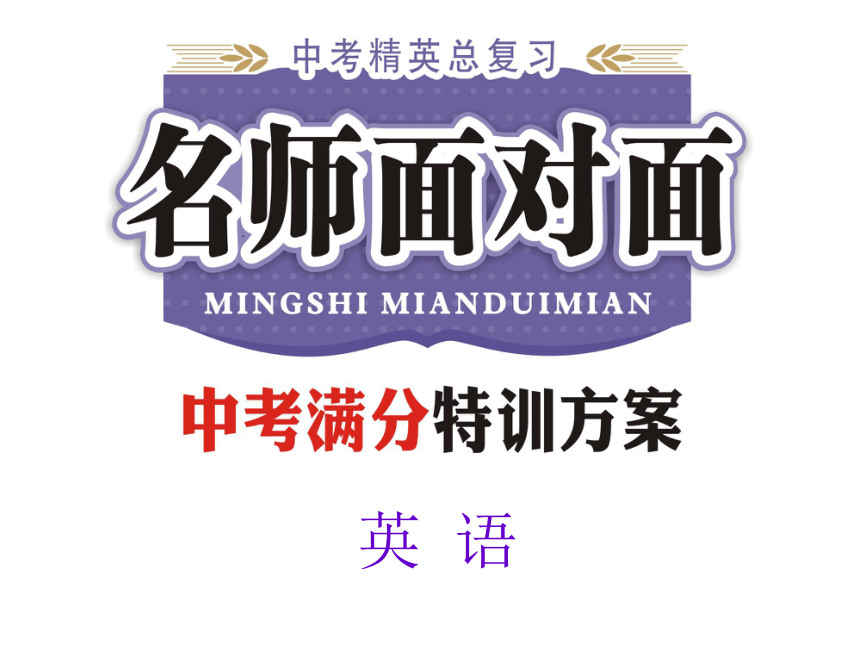 | |
| 格式 | zip | ||
| 文件大小 | 932.3KB | ||
| 资源类型 | 教案 | ||
| 版本资源 | 外研版 | ||
| 科目 | 英语 | ||
| 更新时间 | 2014-12-19 19:07:36 | ||
图片预览

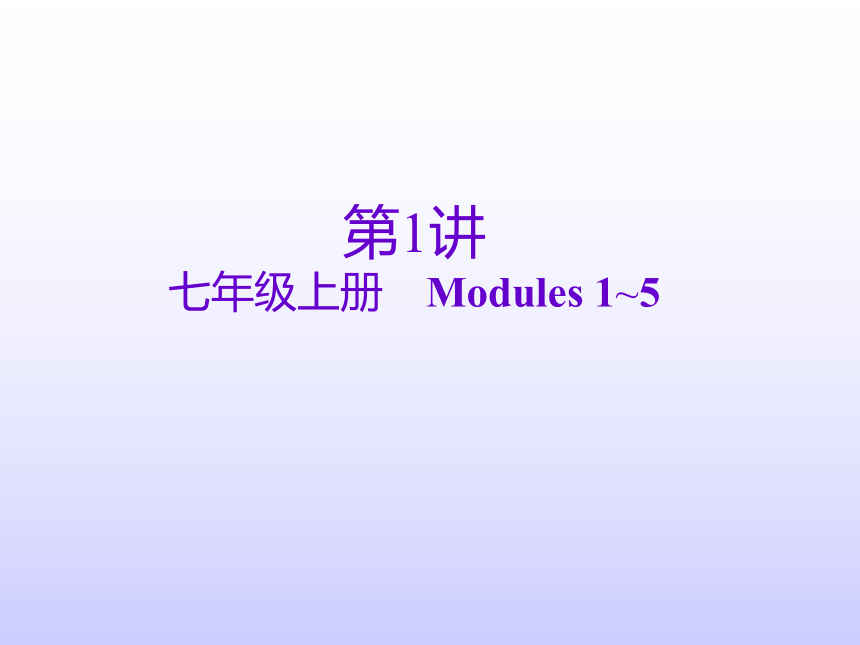
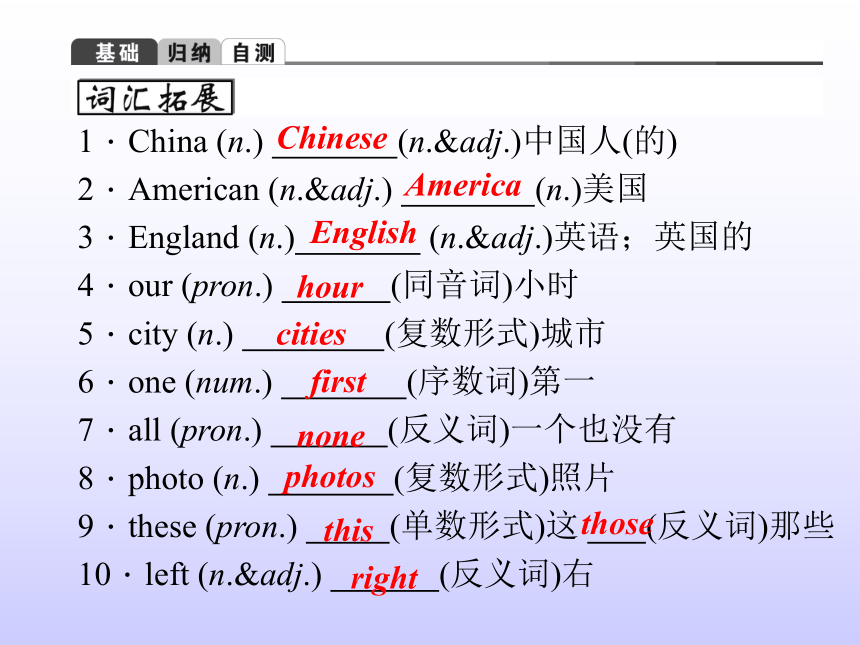
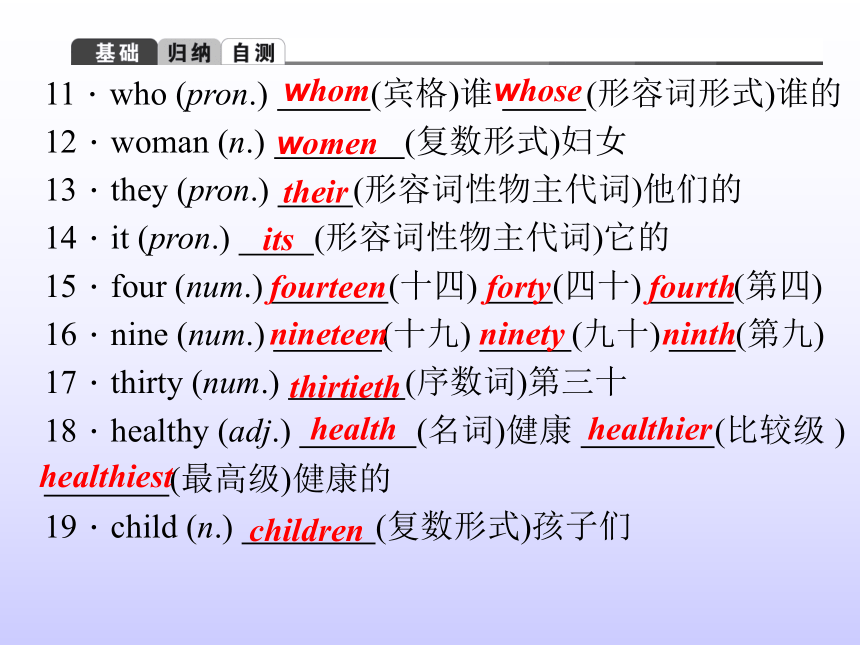
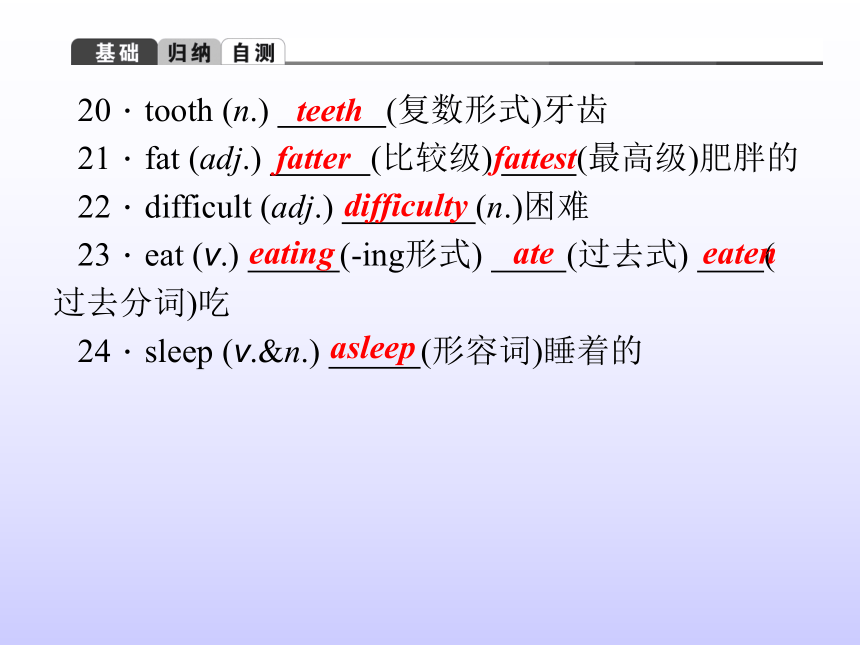
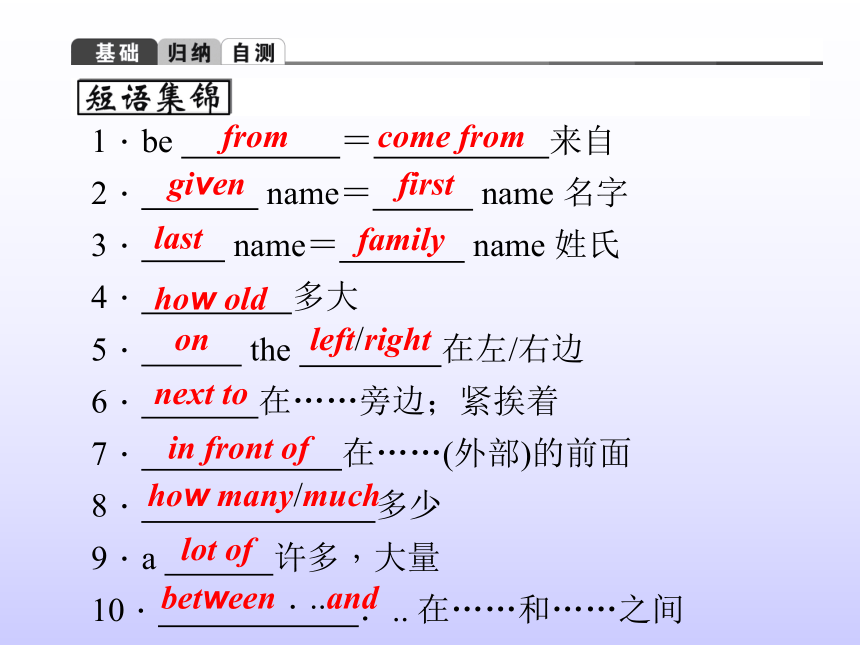
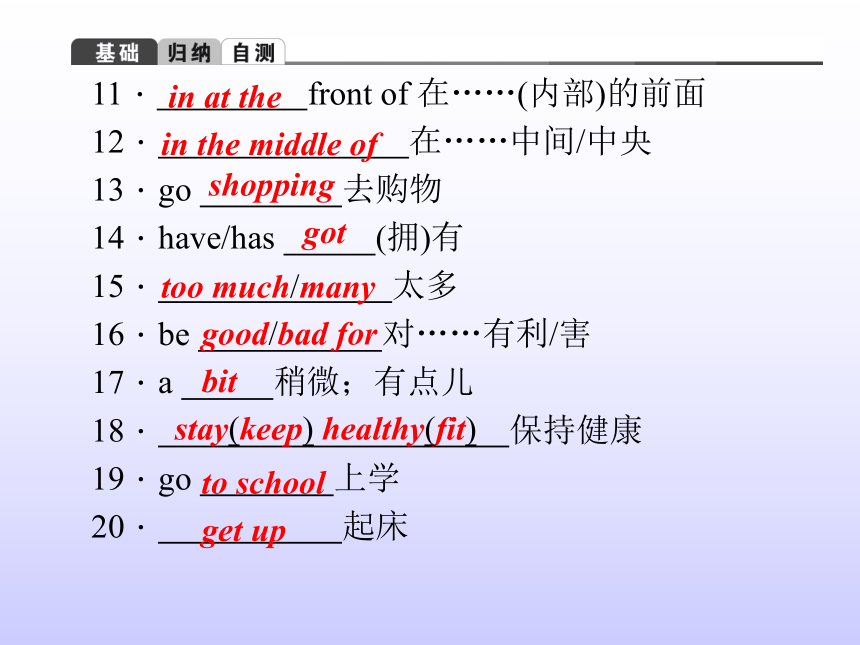
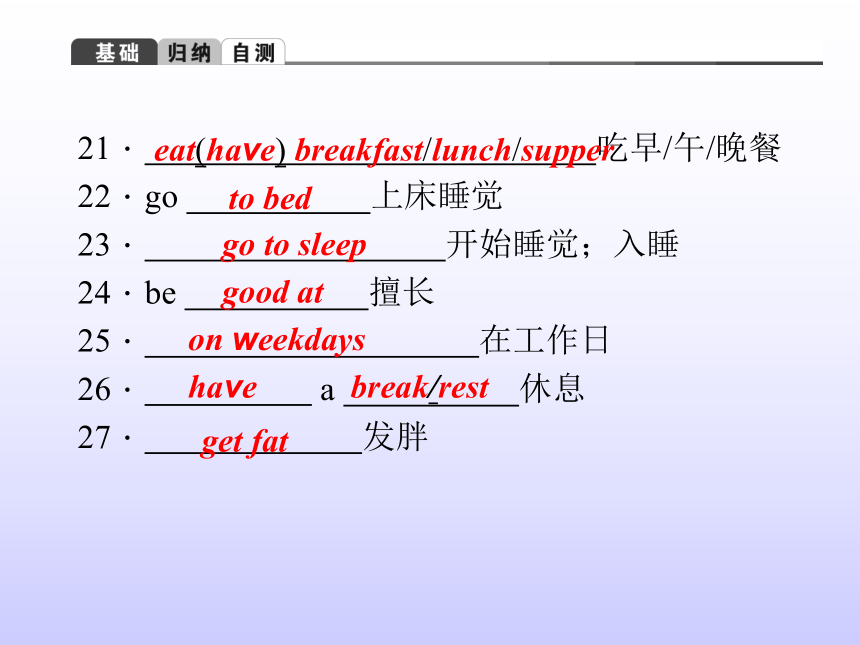
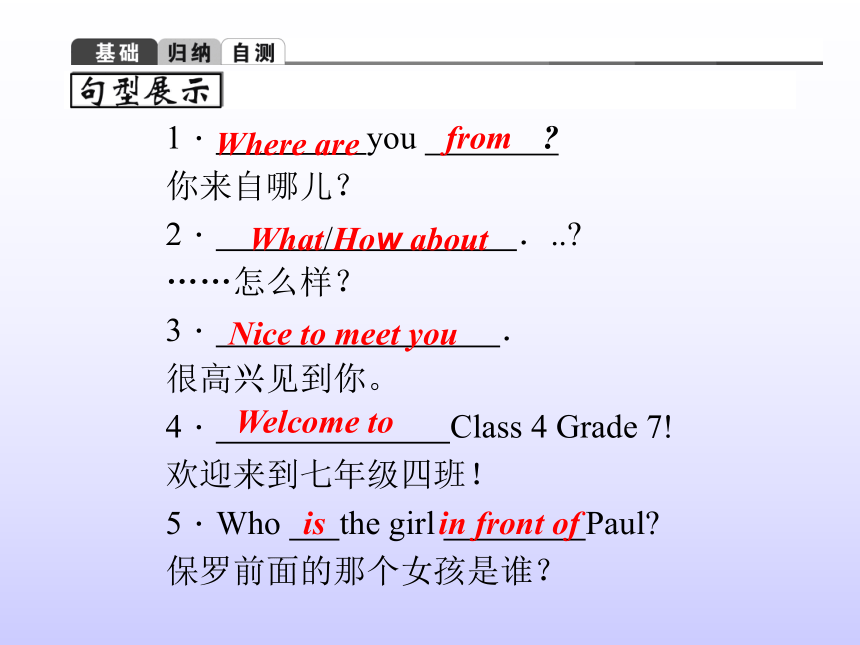
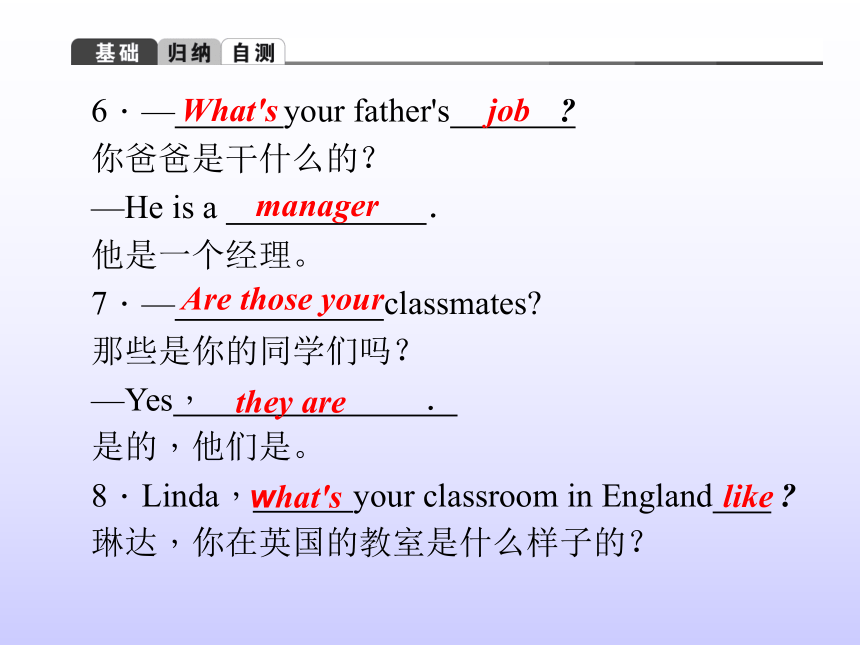
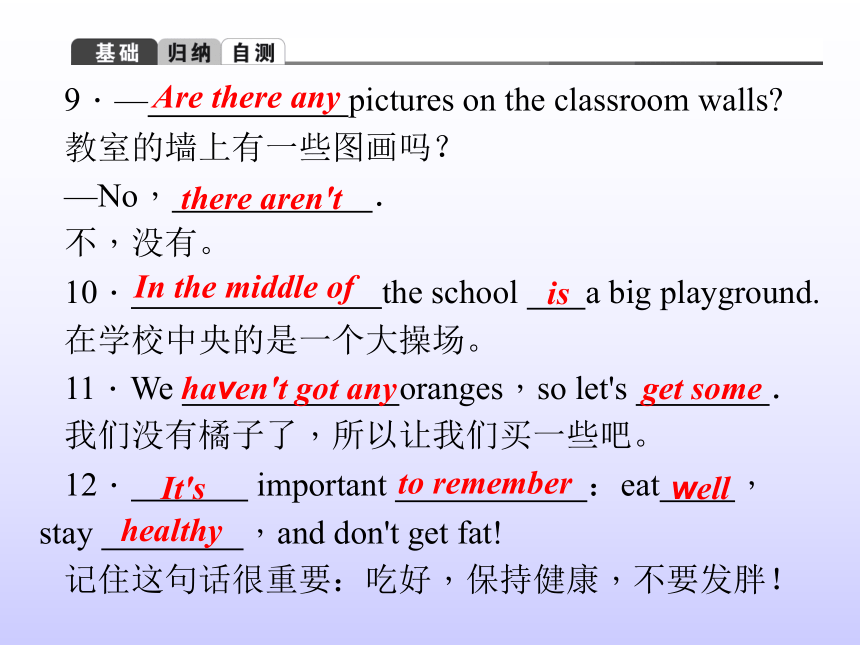
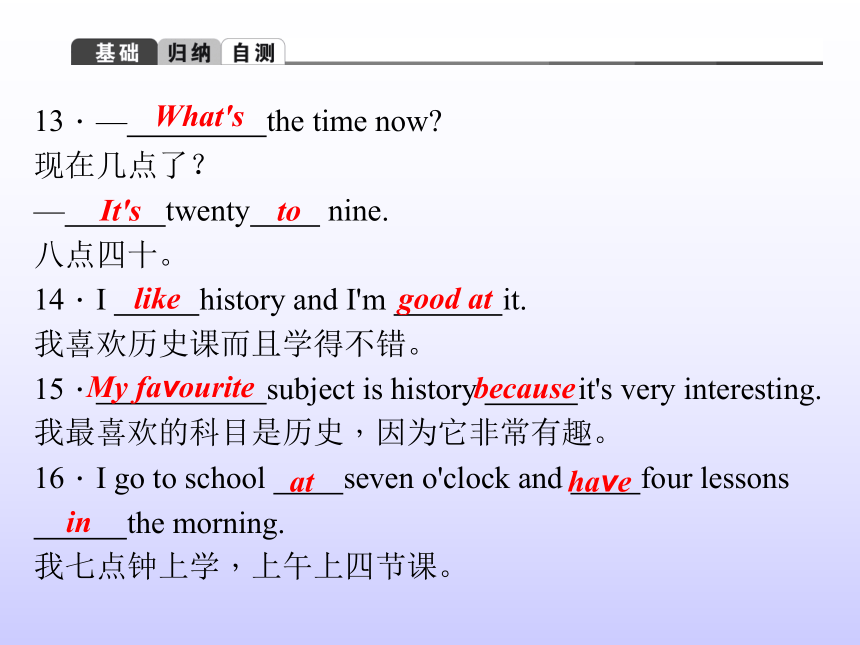
文档简介
课件50张PPT。英 语第1讲
七年级上册 Modules 1~51.China (n.) (n.&adj.)中国人(的)
2.American (n.&adj.) (n.)美国
3.England (n.) (n.&adj.)英语;英国的
4.our (pron.) (同音词)小时
5.city (n.) (复数形式)城市
6.one (num.) (序数词)第一
7.all (pron.) (反义词)一个也没有
8.photo (n.) (复数形式)照片
9.these (pron.) (单数形式)这 (反义词)那些
10.left (n.&adj.) (反义词)右ChineseAmericaEnglishhourcitiesfirstnone photosthisthoseright11.who (pron.) (宾格)谁 (形容词形式)谁的
12.woman (n.) (复数形式)妇女
13.they (pron.) (形容词性物主代词)他们的
14.it (pron.) (形容词性物主代词)它的
15.four (num.) (十四) (四十) (第四)
16.nine (num.) (十九) (九十) (第九)
17.thirty (num.) (序数词)第三十
18.healthy (adj.) (名词)健康 (比较级 )
(最高级)健康的
19.child (n.) (复数形式)孩子们whomwhosewomentheiritsfourteenfortyfourthnineteenninetyninththirtiethhealthhealthierhealthiestchildren20.tooth (n.) (复数形式)牙齿
21.fat (adj.) (比较级) (最高级)肥胖的
22.difficult (adj.) (n.)困难
23.eat (v.) (-ing形式) (过去式) (过去分词)吃
24.sleep (v.&n.) (形容词)睡着的teethfatterfattestdifficultyeatingateeatenasleep1.be = 来自
2. name= name 名字
3. name= name 姓氏
4. 多大
5. the 在左/右边
6. 在……旁边;紧挨着
7. 在……(外部)的前面
8. 多少
9.a 许多,大量
10. ... 在……和……之间fromcome fromgivenfirstlasthow oldonleft/rightnext toin front ofhow many/muchlot ofbetween...andfamily11. front of 在……(内部)的前面
12. 在……中间/中央
13.go 去购物
14.have/has (拥)有
15. 太多
16.be 对……有利/害
17.a 稍微;有点儿
18. 保持健康
19.go 上学
20. 起床in at thein the middle ofshoppinggottoo much/manygood/bad forbitstay(keep) healthy(fit)to schoolget up21. 吃早/午/晚餐
22.go 上床睡觉
23. 开始睡觉;入睡
24.be 擅长
25. 在工作日
26. a 休息
27. 发胖eat(have) breakfast/lunch/supperto bedgo to sleepgood aton weekdayshavebreak/restget fat1. you ?
你来自哪儿?
2. ...?
……怎么样?
3. .
很高兴见到你。
4. Class 4 Grade 7!
欢迎来到七年级四班!
5.Who the girl Paul?
保罗前面的那个女孩是谁?Where arefromWhat/How aboutNice to meet youWelcome toisin front of6.— your father's ?
你爸爸是干什么的?
—He is a .
他是一个经理。
7.— classmates?
那些是你的同学们吗?
—Yes, .
是的,他们是。
8.Linda, your classroom in England ?
琳达,你在英国的教室是什么样子的?What's jobmanagerAre those yourthey arewhat'slike9.— pictures on the classroom walls?
教室的墙上有一些图画吗?
—No, .
不,没有。
10. the school a big playground.
在学校中央的是一个大操场。
11.We oranges,so let's .
我们没有橘子了,所以让我们买一些吧。
12. important :eat ,stay ,and don't get fat!
记住这句话很重要:吃好,保持健康,不要发胖!Are there anythere aren'tIn the middle ofishaven't got anyget someIt'sto remember wellhealthy13.— the time now?
现在几点了?
— twenty nine.
八点四十。
14.I history and I'm it.
我喜欢历史课而且学得不错。
15. subject is history it's very interesting.
我最喜欢的科目是历史,因为它非常有趣。
16.I go to school seven o'clock and four lessons
the morning.
我七点钟上学,上午上四节课。What'sIt's tolikegood atMy favourite because athavein1.Chinese
【典例在线】
I'm learning Chinese.我正在学汉语。
He is a Chinese boy.他是一个中国男孩。
We are Chinese.我们是中国人。
【拓展精析】
Chinese是兼类词。作名词意为“汉语”(用单数);“中国人”(单复数形式一样)。作形容词意为“中国的,中国人的”。
【活学活用】
(1)There are five (中国人)in the school.
(2)He often practises (汉语) with his (中国的) friends.ChineseChineseChinese2.first
【典例在线】
This is my first time to visit the Great Wall.这是我第一次参观长城。
Work must come first.工作必须放在第一位。
【拓展精析】
first当序数词用时,前面常用定冠词“the”,但其前有物主代词或名词所有格时,则不用“the”。作副词意为“先,首先”。
【活学活用】
(3)They went to the new supermarket for the (one) time.
(4)The boy always finishes his homework (先),and then goes to bed.firstfirst3.family
【典例在线】
This is a photo of Tony‘s family.这是托尼一家
His family all like reading.他的家人都喜欢读书。
【拓展精析】
family当“家,家庭”用时,是可数名词。其复数形式为families;当“家人”用时,是个集合名词,无复数形式,作主语时,谓语动词要用复数形式。
类似的集合名词还有people,class,police等。
【活学活用】
(5)How many people are there in your (家庭)?(2014,铜仁)
(6)Look!Her family (am/is/are) watching the football match on TV.familyare4.healthy
【典例在线】
We must eat healthy food.It's good for our health.
我们必须吃健康的食物。它对我们的健康有好处。
【拓展精析】
health(n.)“健康”;healthy(adj.)“健康的”。
相关短语:be in good health(身体)健康;be good for health对健康有益;keep/stay healthy/fit保持健康。
【活学活用】(7)We need a lifestyle.
(8)Eating too much sugar is bad for our .health healthy 5.chicken
【典例在线】
The old lady keeps some chickens.那个老太太饲养了一些小鸡。
I don't like chicken,but my sister does.我不喜欢吃鸡肉,但我的姐姐喜欢。
【拓展精析】
chicken当“小鸡”用时,是可数名词,其复数形式为chickens;当“鸡肉”用时,则为不可数名词。类似的名词还有:exercise(“练习”为可数名词;“操”要用复数形式;“锻炼”为不可数名词);fish(“鱼,鱼肉”为不可数名词;强调“鱼的种类”则为可数名词);orange(“橘子”为可数名词;“橘子汁”则为不可数名词);glass(“玻璃杯”为可数名词;“眼镜”则用复数形式glasses;“玻璃”则为不可数名词)等。
【活学活用】
(9)We all like (chicken/chickens),because they look very lovely.
(10)I like to drink ____ better.
A.an orange B.oranges
C.orange D.the orangeschickensC6.remember
【典例在线】
I remember to post his letter.我记得要为他寄信。
I remember posting his letter.我记得为他寄过信。
【拓展精析】
remember动词,意为“记住”,常用结构如下:
remember to do sth.记得去做某事(未做)
remember doing sth.记得做过某事(已做)
其反义词为forget,用法与remember类似,即forget to do sth.(忘记要做某事)和forget doing sth.(忘记做过某事)【活学活用】
(11)—What's this?
—Oh,my god!It's a gift for James.I forgot ____ it this afternoon.
A.to post B.posting
C.post D.posts
(12)—I'm sorry,Mr Li.I ____ my English homework at home.
—Don't forget ________ it to school tomorrow.
A.left;to bring B.forgot;to take
C.lost;to bring D.remembered;to takeAA1.Hello,what about you?你好,你呢?
【典例在线】
What about the car over there?那边的那辆汽车怎么样?
What about going swimming?去游泳怎么样?
【拓展精析】
What about...?意为“……怎么样?”,是个省略句,常用来询问他人的情况,征求意见或提出建议。其后接名词、代词或动词的-ing形式。相当于“How about...?”。【活学活用】
(1)—Kate is good at drawing.____ her brother?
—He is also good at drawing.
A.And B.What
C.How D.What about
(2)It is quite fine today!How about (go) climbing this afternoon?(2014,绥化)Dgoing2.What a big family!好大的一个家庭啊!
【典例在线】
What a clever boy (he is)!(他是个)多么聪明的男孩啊!
What beautiful flowers they are!多漂亮的花儿啊!
How fast he runs!他跑得多么快呀!
How time flies!光阴似箭!
【拓展精析】
感叹句常用what和how来引导。
what引导的感叹句的结构为:What+a/an+adj.+单数可数名词+主谓;What+adj.+复数名词+主谓;What+adj.+不可数名词+主谓。what修饰名词。how引导的感叹句的结构为:How+adj./adv.+主谓;How+adj.+a/an+单数可数名词+主谓。此时,how修饰形容词或副词。而在How+主谓结构中,how修饰动词。
【活学活用】
(3)The robot can help me sweep the floor.____ smart invention it is!(2014,上海)
A.What B.What a
C.What an D.How
(4)____ seriously ill the poor old monkey is!
A.How B.What a
C.What D.How a
3.This is Daming.这是大明。BA【典例在线】
Jim,this is my mother.吉姆,这是我母亲。
That is my uncle.那是我叔叔。
These are my grandparents.这是我的(外)祖父母。
【拓展精析】
向别人介绍某人时,常用“This is...(这是……)”或“That is...(那是……)”;
向别人介绍两个或两个以上的人时,常用“These are...(这些是……)”或“Those are...(那些是……)”。
在电话用语中,常用“This is...(我是……)”,“Is that...(你是……吗?)”。【活学活用】
(5)这就是著名舞蹈演员——杨彩旗。
the famous dancer,Yang Caiqi.
(6)—Hello,____Mike speaking?
—Sorry.He has gone to Beijing.
A.is this B.is that
C.are you D.is theseThis isB4.What's your father's job?你父亲的工作是什么?
【典例在线】
What does your mother do?
=What is your mother?
=What's your mother's job?
你妈妈的工作是什么?
【拓展精析】
询问某人的职业,可用:
What does sb. do?=What's sb.?=What's sb.'s job?
回答时用:She/He is a/an...【活学活用】
(7)—____?
—She is an astronaut.
A.What's Wang Yaping doing
B.Is Wang Yaping an astronaut
C.Who's Wang Yaping
D.What does Wang Yaping do
(8)—Do you know____?
—She is a nurse.
A.what she is B.who is she
C.who she is D.what is sheDA5.There's a computer in my classroom.在我的教室里有一台电脑。
【典例在线】
There is some water in the cup.杯子里有些水。
There are some apples and a pear on the table.=There is a pear and some apples on the table.
桌子上有些苹果和一个梨子。
【拓展精析】
There be+某人或某物+表示地点或时间的状语。There be结构中的be动词的形式要遵循就近一致原则:即be动词后面的名词是单数或不可数名词时用is;复数时用are。
There be句型的否定句:在be动词后加not。
There be句型的一般疑问句:将be动词提前。【活学活用】
(9)There ____ lots of sheep and pigs on my uncle's farm now.(2014,重庆A)
A.was B.were C.is D.are
(10)There ____ more and more foreigners learning Chinese now.(2014,重庆B)
A.is B.are C.was D.were
(11)There ____ some milk and two eggs on the table.
A.is B.are C.has D.haveDBA6.Linda,what's your classroom in England like?琳达,你在英国的教室是什么样的?
【典例在线】
What's the weather like today?今天的天气怎么样?
What will the life be like in 20 years?20年后,生活会是什么样的?
【拓展精析】
What's...like?意为“……怎么样?”经常与“How is...”互换。但当句子的主语是人时,侧重于对性格特征进行提问,而“How is sb.?”侧重于对身体状况提问。
【活学活用】
(12)—____ the weather like in Beijing in winter?
—Very cold.
A.How B.What C.How's D.What's
(13)—____?
—He is very outgoing and helpful.
A.How is your friend
B.What does your friend like
C.What is your friend like
D.What is your friendDC1.how much,how many
【典例在线】
How much progress in English have you made this year?今年你的英语取得多少进步?
How many pupils are there in a class?
一个班有多少学生?
【拓展精析】
都意为“多少”。how much后接不可数名词;how many后接可数名词的复数形式。how much还可意为“多少钱”,相当于What's the price of...?【活学活用】
(1)—Jenny,I need some milk.(2013,济南)
—OK,Mum.____ do you need?
A.How much B.How many
C.How often D.How long
(2)—____ apples do we need to make fruit salad?
—Let me think...We need three apples.(2013,枣庄)
A.How long B.How often
C.How much D.How manyAD2.some,any
【典例在线】
—Are there any students in the classroom?
教室里有一些学生吗?
—Yes,there are some students doing homework.
是,有一些学生在做作业。
I can't see any vegetables in the kitchen.我在厨房里没看见蔬菜
【拓展精析】
some与any都有“一些”的意思,其后可接可数名词也可接不可数名词。some一般用在肯定句中,any用在否定句、疑问句和条件状语从句中。但some也可用于提建议,提请求,希望对方作肯定回答的疑问句中。any用于肯定句时,表示“任何一个/一些”。【活学活用】
(3)—Is there ____ beef in the fridge?
—No,there isn't.There is ________ pork.(2014,天津)
A.some;any B.any;any
C.some;some D.any;some
(4)If you have ____ new message on it,please call me.
A.any B.some C.lots D.no
3.in front of,in the front of
【典例在线】
Kate is standing next to the teacher's desk,in the front of the classroom.
凯特正站在讲桌的旁边,教室的前面。
There is a big tree in front of the building.
那幢楼房的前面有棵大树。DA【拓展精析】
in front of...在……(范围外)的前面,其反义词为behind;in the front of...在……(范围内)的前面,介词in也可以换成at,即at the front of,其反义词为at the back of...
在某一些短语中,有无冠词,意思的差别很大。如:
in hospital住院/in the hospital在医院里;in bed卧床(睡觉/休息)/on the bed(位置)在床上;at table用餐/at the table在桌子旁;on earth究竟/on the earth在地球上;go to school上学/go to the school到学校去(不一定去学校学习);in class在课堂上/in the class在班级里...【活学活用】
(5)Uncle Tom is ____ hospital,he was hurt at ________ table outside.
A.in;a B.in;不填
C.in the;the D.in the;不填
(6)Jim sits ____ front of the classroom and ________ front of Jack.
A.in;in B.in;in the
C.in the;in D.in the;in theBC4.have/has,have/has got
【典例在线】
I have got some new picture books.我有一些新图画书。
Mr and Mrs Black have a daughter and a son.布莱克夫妇有一个女儿和一个儿子。
【拓展精析】
have/has和have/has got都有“有”的意思。但have/has got中的have/has是助动词,无意义,其否定形式在have/has后加not,疑问形式将have/has置于句首。而have/has当“有”用时,是实义动词,其否定句,疑问句需借助于助动词do/does/did。【活学活用】
(7)—Ann is very shy.She hardly ____ any friends,does she?
—No,she doesn't.
A.has B.doesn't have
C.has got D.doesn't have got
(8)—____ you ________ a long ruler?
—Yes,I do.
A.Have;got B.Do;have got
C.Do;have D.Have;不填AC1.Hangzhou is ____ to hundreds of foreign friends who are working and studying here.
A.home B.house C.family D.room
2.—What can I do for you?(2013,娄底)
—Er,I want a glass of milk,some bread and ____.
A.some chickens B.any chickens
C.some chicken D.any chicken
3.—____ bookcase is this?
—It must be ________.
A.Who's;Tom B.Who's;Tom's
C.Whose;Tom's D.Whose;TomACC4.—____ is your new schoolbag?
—It's ¥30.
A.How many B.How much
C.How long D.How far
5.—Does Miss White like sports?
—Yes.____favourite sport is tennis.
A.He B.She C.His D.Her
6.There ____ many small things we can do to make the world a better place.
A.are B.is C.have D.Has26BDA7.—Hello,this is Wendy.Can I speak to Jessica?
—Yes,____.
A.Jessica is me B.Jessica,please
C.my name is Jessica D.this is Jessica speaking
8.—I need ____ medicine.Could you help me?
—Of course.What about ________ you to the doctor?
A.some;take B.any;take
C.any;taking D.some;taking
9.The student parked his bicycle ____ the classroom,and then walked into the classroom.
A.in front of B.at front of
C.at the front of D.in the front ofDDA10.—____?
—He is an English teacher in our school.
A.What is your uncle doing
B.Where do you work
C.What's your uncle's job
D.How is your uncle
11.—Is this ____ bike?(2014,铜仁)
—No,it's Lily's.________ is over there.
A.your;My B.your;Mine
C.yours;Mine D.yours;My
12.David Beckham has ____ sons.Brooklyn Beckham is his ______ son.
A.third;first B.three;one
C.three;first D.third;oneCBC13.Tony is a quiet student,____ he is active in class.
A.so B.and C.but D.or
14.It only ____ him 20 minutes ________ to his office every day.
A.takes;to drive B.took;drive
C.takes;drive D.took;to drive
15.—Are you in Class One?
—____.
A.No,I don't B.Yes,I am
C.Yes,I do D.Yes,I'mCAB 留言条类写作
一、留言条的基本格式
(日期)________
________(称呼),
I arrived________(到达时间)by train.I am staying at________(现在所处地点).Please________(要求).
________(签名)
二、留言条写作应注意的事项
1.日期:一般写在右上角,通常只需写星期几或具体时间。
2.称呼:称呼写在第二行,要左起顶格写。语气可轻松些,如Dear John或John等。
3.正文:正文要另起一行,用词要通俗易懂。若有事请假,或向别人借东西等,语气要委婉。4.签名:位置在正文的右下角。
5.注意电话留言条还要写清电话是谁打来的、给谁的、日期和具体时间。具体见下列模式:
From:________ To:________
Date:________ Time:________
Message:________________________________________________________________________
________________________________________________________________________
________(签名)
三、常用写作表达
1.I need you to…我需要你……
2.Could you please…?能请你……吗?
3.Please…请……
4.Thank you for inviting me…谢谢你邀请我……
5.I'm sorry…很抱歉……
6.You have to…你必须……
7.You were not in.你不在。
拓展表达:
1.I came to your home,but you weren't at home.我来过你家,但你不在家。
2.Would you like to come to my birthday party?你愿意来参加我的生日晚会吗?
3.He will arrive at 5:00 pm today by train.他将乘火车于今天下午五点到。
4.He asks you to meet him.他叫你去见见他。四、经典范文展示
周六早上詹妮(Jenny)在睡懒觉。他的父亲早上给她留下便条。交代她起床后要打扫卫生、购物买些面包、喂狗及做家庭作业,之后才能玩电子游戏。请以此提示写一篇留言条。
【美文欣赏】
Saturday
Jenny,
You didn't get up when I left home.I need you to do the following things after you get up:1.Clean your room.2.Go shopping some bread.3.Feed the dog.4.Do your homework.You can't play games until you finish all the things.
Your father请完成考点跟踪训练1
七年级上册 Modules 1~51.China (n.) (n.&adj.)中国人(的)
2.American (n.&adj.) (n.)美国
3.England (n.) (n.&adj.)英语;英国的
4.our (pron.) (同音词)小时
5.city (n.) (复数形式)城市
6.one (num.) (序数词)第一
7.all (pron.) (反义词)一个也没有
8.photo (n.) (复数形式)照片
9.these (pron.) (单数形式)这 (反义词)那些
10.left (n.&adj.) (反义词)右ChineseAmericaEnglishhourcitiesfirstnone photosthisthoseright11.who (pron.) (宾格)谁 (形容词形式)谁的
12.woman (n.) (复数形式)妇女
13.they (pron.) (形容词性物主代词)他们的
14.it (pron.) (形容词性物主代词)它的
15.four (num.) (十四) (四十) (第四)
16.nine (num.) (十九) (九十) (第九)
17.thirty (num.) (序数词)第三十
18.healthy (adj.) (名词)健康 (比较级 )
(最高级)健康的
19.child (n.) (复数形式)孩子们whomwhosewomentheiritsfourteenfortyfourthnineteenninetyninththirtiethhealthhealthierhealthiestchildren20.tooth (n.) (复数形式)牙齿
21.fat (adj.) (比较级) (最高级)肥胖的
22.difficult (adj.) (n.)困难
23.eat (v.) (-ing形式) (过去式) (过去分词)吃
24.sleep (v.&n.) (形容词)睡着的teethfatterfattestdifficultyeatingateeatenasleep1.be = 来自
2. name= name 名字
3. name= name 姓氏
4. 多大
5. the 在左/右边
6. 在……旁边;紧挨着
7. 在……(外部)的前面
8. 多少
9.a 许多,大量
10. ... 在……和……之间fromcome fromgivenfirstlasthow oldonleft/rightnext toin front ofhow many/muchlot ofbetween...andfamily11. front of 在……(内部)的前面
12. 在……中间/中央
13.go 去购物
14.have/has (拥)有
15. 太多
16.be 对……有利/害
17.a 稍微;有点儿
18. 保持健康
19.go 上学
20. 起床in at thein the middle ofshoppinggottoo much/manygood/bad forbitstay(keep) healthy(fit)to schoolget up21. 吃早/午/晚餐
22.go 上床睡觉
23. 开始睡觉;入睡
24.be 擅长
25. 在工作日
26. a 休息
27. 发胖eat(have) breakfast/lunch/supperto bedgo to sleepgood aton weekdayshavebreak/restget fat1. you ?
你来自哪儿?
2. ...?
……怎么样?
3. .
很高兴见到你。
4. Class 4 Grade 7!
欢迎来到七年级四班!
5.Who the girl Paul?
保罗前面的那个女孩是谁?Where arefromWhat/How aboutNice to meet youWelcome toisin front of6.— your father's ?
你爸爸是干什么的?
—He is a .
他是一个经理。
7.— classmates?
那些是你的同学们吗?
—Yes, .
是的,他们是。
8.Linda, your classroom in England ?
琳达,你在英国的教室是什么样子的?What's jobmanagerAre those yourthey arewhat'slike9.— pictures on the classroom walls?
教室的墙上有一些图画吗?
—No, .
不,没有。
10. the school a big playground.
在学校中央的是一个大操场。
11.We oranges,so let's .
我们没有橘子了,所以让我们买一些吧。
12. important :eat ,stay ,and don't get fat!
记住这句话很重要:吃好,保持健康,不要发胖!Are there anythere aren'tIn the middle ofishaven't got anyget someIt'sto remember wellhealthy13.— the time now?
现在几点了?
— twenty nine.
八点四十。
14.I history and I'm it.
我喜欢历史课而且学得不错。
15. subject is history it's very interesting.
我最喜欢的科目是历史,因为它非常有趣。
16.I go to school seven o'clock and four lessons
the morning.
我七点钟上学,上午上四节课。What'sIt's tolikegood atMy favourite because athavein1.Chinese
【典例在线】
I'm learning Chinese.我正在学汉语。
He is a Chinese boy.他是一个中国男孩。
We are Chinese.我们是中国人。
【拓展精析】
Chinese是兼类词。作名词意为“汉语”(用单数);“中国人”(单复数形式一样)。作形容词意为“中国的,中国人的”。
【活学活用】
(1)There are five (中国人)in the school.
(2)He often practises (汉语) with his (中国的) friends.ChineseChineseChinese2.first
【典例在线】
This is my first time to visit the Great Wall.这是我第一次参观长城。
Work must come first.工作必须放在第一位。
【拓展精析】
first当序数词用时,前面常用定冠词“the”,但其前有物主代词或名词所有格时,则不用“the”。作副词意为“先,首先”。
【活学活用】
(3)They went to the new supermarket for the (one) time.
(4)The boy always finishes his homework (先),and then goes to bed.firstfirst3.family
【典例在线】
This is a photo of Tony‘s family.这是托尼一家
His family all like reading.他的家人都喜欢读书。
【拓展精析】
family当“家,家庭”用时,是可数名词。其复数形式为families;当“家人”用时,是个集合名词,无复数形式,作主语时,谓语动词要用复数形式。
类似的集合名词还有people,class,police等。
【活学活用】
(5)How many people are there in your (家庭)?(2014,铜仁)
(6)Look!Her family (am/is/are) watching the football match on TV.familyare4.healthy
【典例在线】
We must eat healthy food.It's good for our health.
我们必须吃健康的食物。它对我们的健康有好处。
【拓展精析】
health(n.)“健康”;healthy(adj.)“健康的”。
相关短语:be in good health(身体)健康;be good for health对健康有益;keep/stay healthy/fit保持健康。
【活学活用】(7)We need a lifestyle.
(8)Eating too much sugar is bad for our .health healthy 5.chicken
【典例在线】
The old lady keeps some chickens.那个老太太饲养了一些小鸡。
I don't like chicken,but my sister does.我不喜欢吃鸡肉,但我的姐姐喜欢。
【拓展精析】
chicken当“小鸡”用时,是可数名词,其复数形式为chickens;当“鸡肉”用时,则为不可数名词。类似的名词还有:exercise(“练习”为可数名词;“操”要用复数形式;“锻炼”为不可数名词);fish(“鱼,鱼肉”为不可数名词;强调“鱼的种类”则为可数名词);orange(“橘子”为可数名词;“橘子汁”则为不可数名词);glass(“玻璃杯”为可数名词;“眼镜”则用复数形式glasses;“玻璃”则为不可数名词)等。
【活学活用】
(9)We all like (chicken/chickens),because they look very lovely.
(10)I like to drink ____ better.
A.an orange B.oranges
C.orange D.the orangeschickensC6.remember
【典例在线】
I remember to post his letter.我记得要为他寄信。
I remember posting his letter.我记得为他寄过信。
【拓展精析】
remember动词,意为“记住”,常用结构如下:
remember to do sth.记得去做某事(未做)
remember doing sth.记得做过某事(已做)
其反义词为forget,用法与remember类似,即forget to do sth.(忘记要做某事)和forget doing sth.(忘记做过某事)【活学活用】
(11)—What's this?
—Oh,my god!It's a gift for James.I forgot ____ it this afternoon.
A.to post B.posting
C.post D.posts
(12)—I'm sorry,Mr Li.I ____ my English homework at home.
—Don't forget ________ it to school tomorrow.
A.left;to bring B.forgot;to take
C.lost;to bring D.remembered;to takeAA1.Hello,what about you?你好,你呢?
【典例在线】
What about the car over there?那边的那辆汽车怎么样?
What about going swimming?去游泳怎么样?
【拓展精析】
What about...?意为“……怎么样?”,是个省略句,常用来询问他人的情况,征求意见或提出建议。其后接名词、代词或动词的-ing形式。相当于“How about...?”。【活学活用】
(1)—Kate is good at drawing.____ her brother?
—He is also good at drawing.
A.And B.What
C.How D.What about
(2)It is quite fine today!How about (go) climbing this afternoon?(2014,绥化)Dgoing2.What a big family!好大的一个家庭啊!
【典例在线】
What a clever boy (he is)!(他是个)多么聪明的男孩啊!
What beautiful flowers they are!多漂亮的花儿啊!
How fast he runs!他跑得多么快呀!
How time flies!光阴似箭!
【拓展精析】
感叹句常用what和how来引导。
what引导的感叹句的结构为:What+a/an+adj.+单数可数名词+主谓;What+adj.+复数名词+主谓;What+adj.+不可数名词+主谓。what修饰名词。how引导的感叹句的结构为:How+adj./adv.+主谓;How+adj.+a/an+单数可数名词+主谓。此时,how修饰形容词或副词。而在How+主谓结构中,how修饰动词。
【活学活用】
(3)The robot can help me sweep the floor.____ smart invention it is!(2014,上海)
A.What B.What a
C.What an D.How
(4)____ seriously ill the poor old monkey is!
A.How B.What a
C.What D.How a
3.This is Daming.这是大明。BA【典例在线】
Jim,this is my mother.吉姆,这是我母亲。
That is my uncle.那是我叔叔。
These are my grandparents.这是我的(外)祖父母。
【拓展精析】
向别人介绍某人时,常用“This is...(这是……)”或“That is...(那是……)”;
向别人介绍两个或两个以上的人时,常用“These are...(这些是……)”或“Those are...(那些是……)”。
在电话用语中,常用“This is...(我是……)”,“Is that...(你是……吗?)”。【活学活用】
(5)这就是著名舞蹈演员——杨彩旗。
the famous dancer,Yang Caiqi.
(6)—Hello,____Mike speaking?
—Sorry.He has gone to Beijing.
A.is this B.is that
C.are you D.is theseThis isB4.What's your father's job?你父亲的工作是什么?
【典例在线】
What does your mother do?
=What is your mother?
=What's your mother's job?
你妈妈的工作是什么?
【拓展精析】
询问某人的职业,可用:
What does sb. do?=What's sb.?=What's sb.'s job?
回答时用:She/He is a/an...【活学活用】
(7)—____?
—She is an astronaut.
A.What's Wang Yaping doing
B.Is Wang Yaping an astronaut
C.Who's Wang Yaping
D.What does Wang Yaping do
(8)—Do you know____?
—She is a nurse.
A.what she is B.who is she
C.who she is D.what is sheDA5.There's a computer in my classroom.在我的教室里有一台电脑。
【典例在线】
There is some water in the cup.杯子里有些水。
There are some apples and a pear on the table.=There is a pear and some apples on the table.
桌子上有些苹果和一个梨子。
【拓展精析】
There be+某人或某物+表示地点或时间的状语。There be结构中的be动词的形式要遵循就近一致原则:即be动词后面的名词是单数或不可数名词时用is;复数时用are。
There be句型的否定句:在be动词后加not。
There be句型的一般疑问句:将be动词提前。【活学活用】
(9)There ____ lots of sheep and pigs on my uncle's farm now.(2014,重庆A)
A.was B.were C.is D.are
(10)There ____ more and more foreigners learning Chinese now.(2014,重庆B)
A.is B.are C.was D.were
(11)There ____ some milk and two eggs on the table.
A.is B.are C.has D.haveDBA6.Linda,what's your classroom in England like?琳达,你在英国的教室是什么样的?
【典例在线】
What's the weather like today?今天的天气怎么样?
What will the life be like in 20 years?20年后,生活会是什么样的?
【拓展精析】
What's...like?意为“……怎么样?”经常与“How is...”互换。但当句子的主语是人时,侧重于对性格特征进行提问,而“How is sb.?”侧重于对身体状况提问。
【活学活用】
(12)—____ the weather like in Beijing in winter?
—Very cold.
A.How B.What C.How's D.What's
(13)—____?
—He is very outgoing and helpful.
A.How is your friend
B.What does your friend like
C.What is your friend like
D.What is your friendDC1.how much,how many
【典例在线】
How much progress in English have you made this year?今年你的英语取得多少进步?
How many pupils are there in a class?
一个班有多少学生?
【拓展精析】
都意为“多少”。how much后接不可数名词;how many后接可数名词的复数形式。how much还可意为“多少钱”,相当于What's the price of...?【活学活用】
(1)—Jenny,I need some milk.(2013,济南)
—OK,Mum.____ do you need?
A.How much B.How many
C.How often D.How long
(2)—____ apples do we need to make fruit salad?
—Let me think...We need three apples.(2013,枣庄)
A.How long B.How often
C.How much D.How manyAD2.some,any
【典例在线】
—Are there any students in the classroom?
教室里有一些学生吗?
—Yes,there are some students doing homework.
是,有一些学生在做作业。
I can't see any vegetables in the kitchen.我在厨房里没看见蔬菜
【拓展精析】
some与any都有“一些”的意思,其后可接可数名词也可接不可数名词。some一般用在肯定句中,any用在否定句、疑问句和条件状语从句中。但some也可用于提建议,提请求,希望对方作肯定回答的疑问句中。any用于肯定句时,表示“任何一个/一些”。【活学活用】
(3)—Is there ____ beef in the fridge?
—No,there isn't.There is ________ pork.(2014,天津)
A.some;any B.any;any
C.some;some D.any;some
(4)If you have ____ new message on it,please call me.
A.any B.some C.lots D.no
3.in front of,in the front of
【典例在线】
Kate is standing next to the teacher's desk,in the front of the classroom.
凯特正站在讲桌的旁边,教室的前面。
There is a big tree in front of the building.
那幢楼房的前面有棵大树。DA【拓展精析】
in front of...在……(范围外)的前面,其反义词为behind;in the front of...在……(范围内)的前面,介词in也可以换成at,即at the front of,其反义词为at the back of...
在某一些短语中,有无冠词,意思的差别很大。如:
in hospital住院/in the hospital在医院里;in bed卧床(睡觉/休息)/on the bed(位置)在床上;at table用餐/at the table在桌子旁;on earth究竟/on the earth在地球上;go to school上学/go to the school到学校去(不一定去学校学习);in class在课堂上/in the class在班级里...【活学活用】
(5)Uncle Tom is ____ hospital,he was hurt at ________ table outside.
A.in;a B.in;不填
C.in the;the D.in the;不填
(6)Jim sits ____ front of the classroom and ________ front of Jack.
A.in;in B.in;in the
C.in the;in D.in the;in theBC4.have/has,have/has got
【典例在线】
I have got some new picture books.我有一些新图画书。
Mr and Mrs Black have a daughter and a son.布莱克夫妇有一个女儿和一个儿子。
【拓展精析】
have/has和have/has got都有“有”的意思。但have/has got中的have/has是助动词,无意义,其否定形式在have/has后加not,疑问形式将have/has置于句首。而have/has当“有”用时,是实义动词,其否定句,疑问句需借助于助动词do/does/did。【活学活用】
(7)—Ann is very shy.She hardly ____ any friends,does she?
—No,she doesn't.
A.has B.doesn't have
C.has got D.doesn't have got
(8)—____ you ________ a long ruler?
—Yes,I do.
A.Have;got B.Do;have got
C.Do;have D.Have;不填AC1.Hangzhou is ____ to hundreds of foreign friends who are working and studying here.
A.home B.house C.family D.room
2.—What can I do for you?(2013,娄底)
—Er,I want a glass of milk,some bread and ____.
A.some chickens B.any chickens
C.some chicken D.any chicken
3.—____ bookcase is this?
—It must be ________.
A.Who's;Tom B.Who's;Tom's
C.Whose;Tom's D.Whose;TomACC4.—____ is your new schoolbag?
—It's ¥30.
A.How many B.How much
C.How long D.How far
5.—Does Miss White like sports?
—Yes.____favourite sport is tennis.
A.He B.She C.His D.Her
6.There ____ many small things we can do to make the world a better place.
A.are B.is C.have D.Has26BDA7.—Hello,this is Wendy.Can I speak to Jessica?
—Yes,____.
A.Jessica is me B.Jessica,please
C.my name is Jessica D.this is Jessica speaking
8.—I need ____ medicine.Could you help me?
—Of course.What about ________ you to the doctor?
A.some;take B.any;take
C.any;taking D.some;taking
9.The student parked his bicycle ____ the classroom,and then walked into the classroom.
A.in front of B.at front of
C.at the front of D.in the front ofDDA10.—____?
—He is an English teacher in our school.
A.What is your uncle doing
B.Where do you work
C.What's your uncle's job
D.How is your uncle
11.—Is this ____ bike?(2014,铜仁)
—No,it's Lily's.________ is over there.
A.your;My B.your;Mine
C.yours;Mine D.yours;My
12.David Beckham has ____ sons.Brooklyn Beckham is his ______ son.
A.third;first B.three;one
C.three;first D.third;oneCBC13.Tony is a quiet student,____ he is active in class.
A.so B.and C.but D.or
14.It only ____ him 20 minutes ________ to his office every day.
A.takes;to drive B.took;drive
C.takes;drive D.took;to drive
15.—Are you in Class One?
—____.
A.No,I don't B.Yes,I am
C.Yes,I do D.Yes,I'mCAB 留言条类写作
一、留言条的基本格式
(日期)________
________(称呼),
I arrived________(到达时间)by train.I am staying at________(现在所处地点).Please________(要求).
________(签名)
二、留言条写作应注意的事项
1.日期:一般写在右上角,通常只需写星期几或具体时间。
2.称呼:称呼写在第二行,要左起顶格写。语气可轻松些,如Dear John或John等。
3.正文:正文要另起一行,用词要通俗易懂。若有事请假,或向别人借东西等,语气要委婉。4.签名:位置在正文的右下角。
5.注意电话留言条还要写清电话是谁打来的、给谁的、日期和具体时间。具体见下列模式:
From:________ To:________
Date:________ Time:________
Message:________________________________________________________________________
________________________________________________________________________
________(签名)
三、常用写作表达
1.I need you to…我需要你……
2.Could you please…?能请你……吗?
3.Please…请……
4.Thank you for inviting me…谢谢你邀请我……
5.I'm sorry…很抱歉……
6.You have to…你必须……
7.You were not in.你不在。
拓展表达:
1.I came to your home,but you weren't at home.我来过你家,但你不在家。
2.Would you like to come to my birthday party?你愿意来参加我的生日晚会吗?
3.He will arrive at 5:00 pm today by train.他将乘火车于今天下午五点到。
4.He asks you to meet him.他叫你去见见他。四、经典范文展示
周六早上詹妮(Jenny)在睡懒觉。他的父亲早上给她留下便条。交代她起床后要打扫卫生、购物买些面包、喂狗及做家庭作业,之后才能玩电子游戏。请以此提示写一篇留言条。
【美文欣赏】
Saturday
Jenny,
You didn't get up when I left home.I need you to do the following things after you get up:1.Clean your room.2.Go shopping some bread.3.Feed the dog.4.Do your homework.You can't play games until you finish all the things.
Your father请完成考点跟踪训练1
